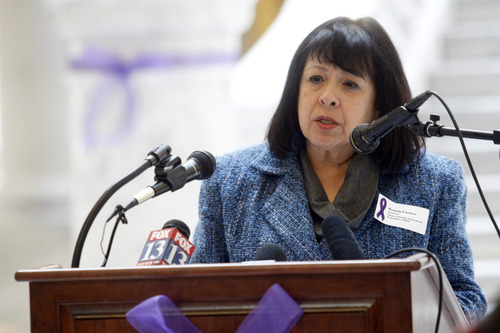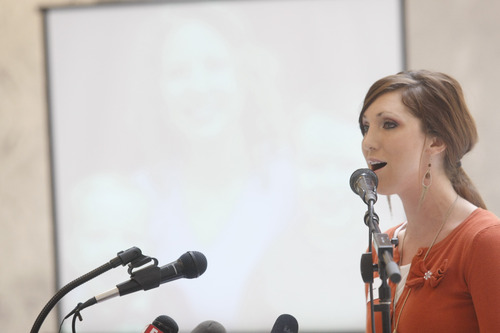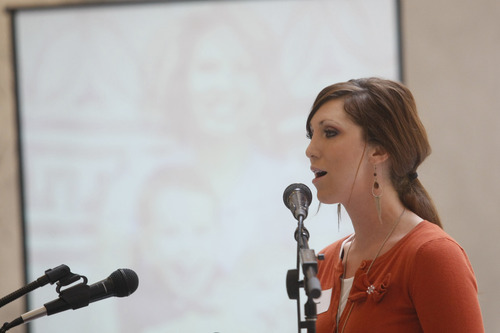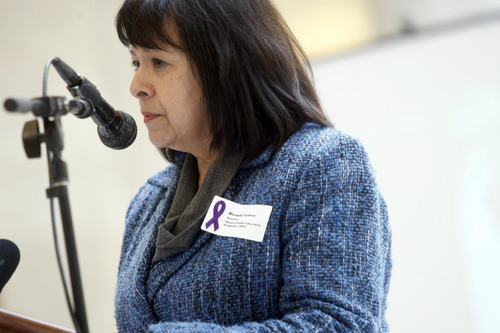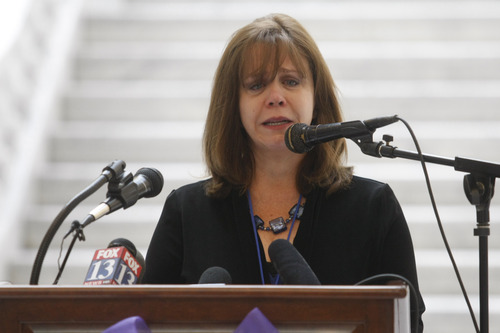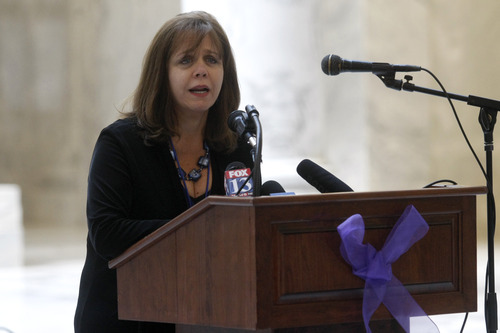This is an archived article that was published on sltrib.com in 2013, and information in the article may be outdated. It is provided only for personal research purposes and may not be reprinted.
Tonya Lemus came home from work to see her toddler son with a black eye. That was the last straw.
Lemus was pregnant, but she grabbed the nearly 2-year-old boy and ran out the door as fast as she could, her husband chasing her with an ice pick because she was finally leaving him.
That was about 25 years ago, but Wednesday was the first time Lemus said she had spoken publicly about the domestic violence that changed her life. She moved around for years trying to make a new life for herself, rearing her children to treat people right. She hoped they wouldn't repeat their father's mistakes and perpetuate a violent cycle.
"It not only affected me, it affected my entire family," Lemus said Wednesday at a news conference in which the Utah Domestic Violence Council released its annual report on domestic violence-related deaths for 2012.
But the council hopes the story will go beyond numbers, which include 29 homicides and suicides this year — fewer than the 33 in 2011, but higher than the nine-year average of 25. Peg Coleman, executive director of the council, stressed that many people are affected by each incident and that the state needs more funding and education to prevent what she described as the most predictable and preventable type of homicide.
Domestic violence is treated mostly as a family issue, but it's a public safety and public health issue, according to Coleman. Utah should be able to "claim to be safest state in the nation for families and children," she said.
Homicides accounted for about two-thirds of the domestic violence-related deaths in 2012; about a third of the victims were perpetrators who killed themselves after killing their significant other, according to the report.
The council offers training to shelters and nonprofits. Those organizations then provide free services to victims and their children, yet remain underfunded, Coleman said.
Annette Macfarlane, chair-elect of the council, feels the financial pinch at the shelter she runs, the New Hope Crisis Center of Box Elder County. Last year, the 14-bed shelter had to turn away 26 people because there was no room and could pay only for some to stay in a motel instead, Macfarlane said in an interview after the news conference. For those who can stay at the shelter, free counseling is offered for adults, but there isn't enough money to help their children.
Young victims of domestic violence include not only a 4-year-old who sees one parent beat the other, but also teens who have seen violence for so long , they subsequently make terrible life choices for themselves, she said. One legacy of violent homes, she added, is bullies who grow up learning they can use power to get what they want.
Macfarlane speculated that the majority of inmates in Utah's prison system grew up with violence. More funding for shelters and nonprofits would not only save families, she argued, but also save the state money spent on correctional and court systems.
Coleman, Macfarlane and other advocates and victims at the news conference stressed that help is available. The council offers a free, confidential information line at 1-800-897-5465 for anyone who is, or knows someone, in a dangerous relationship.
It's not easy to leave, and after someone does, life often seems to get worse before it gets better, Lemus said. But she said she is lucky to be alive today, and the woman who ran out the door urged others to follow her.
"Leave today, not tomorrow," Lemus said.
Coleman also made a point of mentioning Charlie and Braden Powell, the sons of Susan Cox Powell, who were killed by their father, Josh Powell, last February at his Washington home. Though they died out of state and are counted among Washington's statistics, Coleman said Charlie and Braden are Utah children, she said.
Kiirsi Hellewell, Susan's best friend, who attended Wednesday's news conference, said she appreciated the boys' inclusion.
"Things can change with funding, laws and education," she said.
Twitter: @mikeypanda —
2012 domestic violence deaths in Utah
This is a summary of a report released Wednesday by the Utah Domestic Violence Council:
Cohabitant homicides • 9 (2 male, 7 female)
Domestic violence homicides • 6 (3 male, 3 female)
Dating relationship homicides • 2 (1 male, 1 female)
Dating relationship deaths • 2 (2 male)
Perpetrator suicides • 10 (all male)
Weapon used or apparent cause of death
Blunt force trauma • 3
Firearm • 20
Stabbing • 5
Strangulation by hanging • 1
Source: Utah Domestic Violence Council's "2012 Utah Domestic Violence-related Deaths"


